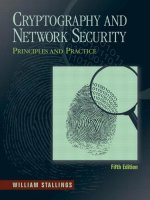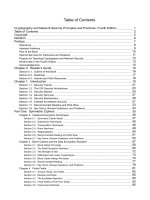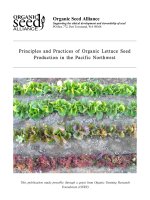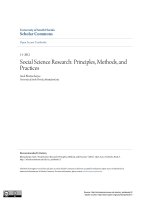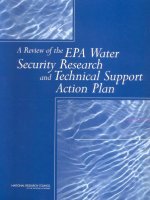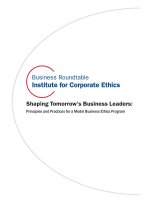Water security principles, perspectives and practices
Bạn đang xem bản rút gọn của tài liệu. Xem và tải ngay bản đầy đủ của tài liệu tại đây (3.07 MB, 376 trang )
Tai Lieu Chat Luong
Water Security
The purpose of this book is to present an overview of the latest research,
policy, practitioner, academic, and international thinking on water security—
an issue that, like water governance a few years ago, has developed much
policy awareness and momentum with a wide range of stakeholders. As a
concept it is open to multiple interpretations, and the authors here set out the
various approaches to the topic from different perspectives.
Key themes addressed include:
•
•
•
•
Watersecurityasaforeignpolicyissue
Theinterconnectedvariablesofwater,food,andhumansecurity
Dimensions other than military and international relations concerns
around water security
Watersecuritytheoryandmethods,toolsandaudits
The book is loosely based on a Master’s level degree plus a short professional course on water security both given at the University of East Anglia,
delivered by international authorities on their subjects. It should serve as an
introductory textbook as well as be of value to professionals, NGOs, and
policymakers.
Bruce LankfordisProfessorofWaterandIrrigationPolicyintheSchoolof
InternationalDevelopmentattheUniversityofEastAnglia,UK.
Karen Bakker is a Professor in Geography, Canada Research Chair in Political
Ecology,andDirectoroftheProgramonWaterGovernanceattheUniversity
of British Columbia, Canada.
Mark ZeitounisaReaderintheSchoolofInternationalDevelopmentatthe
UniversityofEastAnglia,UK,andCo-DirectoroftheUEAWaterSecurity
Research Centre.
Declan ConwayisProfessorofWaterResourcesandClimateChangeinthe
SchoolofInternationalDevelopment,UniversityofEastAnglia,UK.
This page intentionally left blank
Water Security
Principles, Perspectives, and Practices
Edited by Bruce Lankford,
Karen Bakker, Mark Zeitoun,
and Declan Conway
First published 2013
by Routledge
2ParkSquare,MiltonPark,Abingdon,OxonOX144RN
SimultaneouslypublishedintheUSAandCanada
by Routledge
711 Third Avenue, New York, NY 10017
Routledge is an imprint of the Taylor & Francis Group,
an informa business
©2013BruceLankford,KarenBakker,MarkZeitoun,andDeclan
Conway, selection and editorial material; individual chapters, the
contributors
The right of the editors to be identified as the author of the editorial
material, and of the authors for their individual chapters, has been
asserted in accordance with sections 77 and 78 of the Copyright,
DesignsandPatentsAct1988.
All rights reserved. No part of this book may be reprinted or
reproduced or utilized in any form or by any electronic, mechanical,
or other means, now known or hereafter invented, including
photocopying and recording, or in any information storage or
retrieval system, without permission in writing from the publishers.
Trademark Notice: Product or corporate names may be trademarks
or registered trademarks, and are used only for identification and
explanation without intent to infringe.
British Library Cataloguing-in-Publication Data
A catalogue record for this book is available from the British Library
Library of Congress Cataloging-in-Publication Data
Watersecurity:principles,perspectivesandpractices/editedby
BruceLankford,KarenBakker,MarkZeitounandDeclanConway.
pages cm
Includes bibliographical references and index.
1. Watersupply—Governmentpolicy. 2. Watersecurity.
3. Waterresourcesdevelopment. I. Lankford, Bruce A.
HD1691.W36462013
333.91—dc23
2013015504
ISBN:978-0-415-53470-3(hbk)
ISBN:978-0-415-53471-0(pbk)
ISBN:978-0-203-11320-2(ebk)
TypesetinSabon
by Apex CoVantage, LLC
Contents
Preface
Contributors
ix
xi
PART I
Frameworks and Approaches to Water Security
1
1
3
Introduction: A Battle of Ideas for Water Security
MARKZEITOUN,BRUCELANKFORD,KARENBAKKER,
ANDDECLANCONWAY
2
The Web of Sustainable Water Security
11
MARK ZEITOUN
3
The Water Security Paradox and International Law:
Securitisation as an Obstacle to Achieving Water
Security and the Role of Law in Desecuritising
the World’s Most Precious Resource
26
CHRISTINALEBANDPATRICIAWOUTERS
PART II
Perspectives and Principles
47
4
49
Debating the Concept of Water Security
CHRISTINACOOKANDKARENBAKKER
5
The Multiform Water Scarcity Dimension
64
MALIN FALKENMARK
6
Water Security in a Changing Climate
DECLANCONWAY
80
vi
Contents
7 The Role of Cities as Drivers of International
Transboundary Water Management Processes
101
ANTON EARLE
8 The Water–Energy Nexus: Meeting Growing Demand
in a Resource-Constrained World
115
ANTONY FROGGATT
9 Water Security for Ecosystems, Ecosystems for Water Security
130
DAVIDTICKNERANDMIKEACREMAN
10 From Water Productivity to Water Security: A Paradigm Shift?
148
FLORIANE CLEMENT
11 Transboundary Water Security: Reviewing the
Importance of National Regulatory and Accountability
Capacities in International Transboundary River Basins
166
NAHO MIRUMACHI
PART III
Water Security as Practice Debates
181
12 Easy as 1, 2, 3? Political and Technical Considerations
for Designing Water Security Indicators
183
NATHANIELMASON
13 Water Security Risk and Response: The Logic
and Limits of Economic Instruments
204
DUSTINGARRICKANDROBERTHOPE
14 Corporate Water Stewardship: Exploring Private
Sector Engagement in Water Security
220
NICKHEPWORTHANDSTUARTORR
15 The Shotgun Marriage: Water Security, Cultural Politics, and
Forced Engagements between Official and Local Rights
Frameworks
239
RUTGERDBOELENS
16 Infrastructure Hydromentalities: Water Sharing,
Water Control, and Water (In)security
BRUCELANKFORD
256
Contents
17 The Strategic Dimensions of Water: From National
Security to Sustainable Security
vii
273
BENJAMIN ZALA
18 Dances with Wolves: Four Flood Security Frames
289
JEROENWARNER
19 Household Water Security and the Human Right to Water
and Sanitation
307
JONATHANCHENOWETH,ROSALINDMALCOLM,STEVEPEDLEY,
ANDTHOKOKAIME
PART IV
Conclusion
319
20 Food-Water Security: Beyond Water Resources and
the Water Sector
321
J.A.(TONY)ALLAN
21 A Synthesis Chapter: The Incodys Water Security Model
336
BRUCELANKFORD
Index
353
This page intentionally left blank
Preface
It is perhaps not surprising that the increasing use of the term water security
mirrors growing concerns over how society’s needs for resources will be met
andwhowillgainrelativetoothers.Watersecurityisalensthroughwhich
to understand the risks of a lack of water, poor quality water, and inadequatefloodprotection,aswellashowthesearedistributed.Thiscontrasts
with a vernacular understanding of the notion of security, which for water
would imply that in facing these risks, it should be appropriated, annexed
andsecured.Whatthisbook(andliteratureelsewhere)showsisthata‘securitisation’ interpretation of water security is unhelpful in its framing of the
challenge of managing water.
Yet water security resonates with donors, countries, individuals, and
organisations.Watersecurityinvokestheideasofriskbutalsoaction—that
water insecurities exist and can be managed—and in a much more acute way
thantherathermoreneutraltermIWRM(integratedwaterresourcesmanagement)everdid.Whilesomewatermanagers,politicians,CEOs,orindividualsmightseewatersecurityinitsunilateral‘securing’way,manymore
intuitively understand and witness the shared nature of the resource. This
collective, integrated, and action-oriented view of water and water security
is, arguably, common knowledge amongst water scientists, managers, and
users. Thus, although this new term has arrived, their experiences tell them
that the challenges of managing and sharing water remain considerable and
highly complex. In short, little has changed; it would be an absurdity for
water managers and scientists to be exhorted to rethink water in a new
securitising way.
Nevertheless, even when the intention is better management, appropriative and securitising forces are generated continuously, sometimes subtly
and unwittingly, potentially exacerbating shortages and resulting in inequitable distribution of water and water benefits. For example, placing an
irrigation scheme above a small town can disrupt shares of river water during droughts and dry seasons, or in another example, the introduction of
water charges for drinking water might marginalise the poorest in a community. To uncover and mitigate these appropriative forces for the benefit of
publicandenvironmentalgoodsandservicesrequiresanunderstandingof
many factors—entirely the ethos and concern of integrated water resources
x
Preface
management. Therefore, perhaps what is interesting about water security is
that, by implying unilateral action to securitise a resource, it acts as guard
against this phenomenon reminding us that water is prone to capture, and
therefore is best managed when understood collectively and governed cooperatively.Abalanceexists;toreflectuponpossibleinequitiesandinsecurities implied by water security combined with the use of integrative adaptive
frameworks(representedbyIWRM)todelivercollectivewatersolutions.
In this book, our chapter authors reflect on the idea of water security,
applying their own specific lenses and experiences. As editors, we sought out
authorsthatwouldcoverthekeythemesin waterandwatersecurity(e.g.,
law,climatechange,domesticuse,cities)and,withoutgivingourcontributors a strong predetermined interpretation of water security, we asked them
to write from their perspectives. The collective effort in this book may not
be a complete picture of the myriad dimensions of water and water security,
but they do reflect some of the tensions and difficulties faced by science in
accommodatingtheideaofwatersecurity(intermsofprinciples,perspectives,andpractice)whilenavigatingpolitical,economic,environmental,and
social concerns and demands for a sometimes limited and usually highly
variable resource.
We have been helped through the editing process by many people. We
warmly acknowledge the support of Earthscan, particularly Tim Hardwick
andAshleyWright,andalsotheircopyeditingteam.
Considerable thanks are also due to all our reviewers who provided comments on drafts by our chapter authors: Maite Aldaya, Tony Allan, Henning
Bjornlund, Janosz Bogardi, Vincent Casey, Anton Earle, Marie Ekstrom,
TomFranks,DustinGarrick,PhilHirsch,HolgerHoff,GuyHoward,William Howarth, Bryan Karney, Nicole Kranz, Tobias Krueger, Jamie Linton,
Bjørn-Oliver Magsig, Michael Mason, Owen McIntyre, Katharine Meehan,
DougMerrey,FrancoisMolle,JasonMorrissette,MikeMuller,PeterNewborne, Micheal Norton, Thomas Perreault, Jaimie Pittock, Brian Richter,
Chris Scott, Jan Selby, Afreen Siddiqi, Suvi Sojamo, Larry Swatuk, Erik
Swyngedouw, Dan Tarlock, and Govindarajan Venkatesh. Your insights
and diligence greatly improved this book’s exploration of the idea of water
security.
Bruce Lankford, Karen Bakker, Mark Zeitoun, Declan Conway
10 April 2013
Contributors
Mike AcremanisHeadofHydro-EcologyandWetlandsattheCentrefor
EcologyandHydrology,Wallingford,UK,andVisitingProfessoratUniversity College London. His expertise is in environmental flows in rivers and wetland hydrology. In the UK, he is advisor to the Environment
Agency and Natural England, with recent work focusing on defining environmentalflowsfortheWaterFrameworkDirectiveandimpactassessment of wetlands. He was a lead author on freshwater systems in the UK
NationalEcosystemAssessmentandhesitsontheWWF-UKProgramme
Committee. Internationally, he is an advisor to IUCN, the Convention on
Wetlands(Ramsar),andtheWorldBankadvisorypanelonenvironmentalflows.HehasrecentlyeditedaSpecialIssueofHydrological Sciences
JournalonEcosystemServicesofWetlands.Heiscurrentlyleadingwork
fortheConventionsonBiologicalDiversityandWetlands(Ramsar)on
the role of biodiversity in the water cycle.
J. A. (Tony) AllanheadstheLondonWaterResearchGroupatKing’sCollegeLondonandSOAS.Hespecialisesintheanalysisofwaterresources
in semi-arid regions and on the role of global systems in ameliorating local
and regional water deficits. He pointed out that water-short economies
achieve water and food security mainly by importing water-intensive food
commodities. He coined the concept of virtual water. His ideas are set
out in The Middle East Water Question: Hydropolitics and the Global
Economy and in a new book, Virtual Water. He is currently working on
why the accounting systems in the food supply chain are dangerously blind
to the costs of water and of misallocating it. In 2008, he was awarded
theStockholmWaterPrizeinrecognitionofhiscontributiontowaterscience. In 2011, he became Académico Correspondiente Internacional of the
AcademyofSciencesofSpain.
Karen Bakker is a professor in geography, Canada Research Chair in PoliticalEcology,andDirectoroftheProgramonWaterGovernanceatthe
UniversityofBritishColumbia (www.watergovernance.ca).Herresearch
interests span political economy, political ecology, and water management, with a current focus on water supply privatization, delegated water
management, transboundary water governance, and access to urban
xii
Contributors
watersupplyindevelopingcountries.Shehaspublishedindevelopment
studies, environmental studies, geography, urban studies, and interdisciplinary environmental science (including science, global environmental
change,andworlddevelopment).Hertwomostrecentbookpublications
are: Eau Canada(UBCPress,2007)andPrivatizing Water: Governance
Failure and the World’s Urban Water Crisis (Cornell University Press,
2010). Fluent in French and Spanish, Dr. Bakker regularly acts as an
advisor to governments and nongovernmental and international organizations,includingtheOECD,variousUNagencies,DfID,andtheConference Board of Canada.
Rutgerd BoelensisAssociateProfessorinWaterManagementandSocial
Justice,WageningenUniversity,TheNetherlands,andVisitingProfessor
at the Catholic University of Peru. His research focuses on water rights,
legal pluralism, cultural politics, and political ecology in Latin America
andSpain.HedirectedtheWaterLawandIndigenousRights(WALIR)
program;iscoordinatoroftheinternationalJusticiaHídrica/WaterJusticealliance(comparativeresearchonwateraccumulationandconflict
intheAmericas,Europe,Africa,Asia);anddirectstheprograms“StrugglingforWaterSecurity”and“TheTransnationalizationofLocalWater
Struggles” of the Netherlands Organization for Scientific Research.
Recent books include Liquid Relations: Contested Water Rights and
Legal Complexity (with Roth/Zwarteveen, Rutgers University Press,
2005);Water and Indigenous Peoples(UNESCO,2006);Aguas Rebeldes(IEP/Imprefepp,2009);Out of the Mainstream: Water Rights, Politics and Identity(withGetches/Guevara,Earthscan,2010);andJusticia
Hídrica: Accumulation, Conflict and Civil Society Action(withCremers/
Zwarteveen,IEP,2011).
Jonathan Chenoweth is a lecturer in natural resources management in
the Centre for Environmental Strategy at the University of Surrey. His
research focuses upon the institutional and policy dimensions of water
management and sustainable development in developed and developing
regions including in the UK and elsewhere in Europe, the Middle East,
and Africa. His recent work has focused on coping with water scarcity,
water resources management in the context of climate change, attitudes
to water supply services, and the role of the public versus private sector
in the management of water and sanitation services.
Floriane Clément worked as a postdoctoral fellow and researcher at the
InternationalWaterManagementInstitute(IWMI)inHyderabad,India,
from2008to2012.SheisnowpostedattheIWMINepalOffice.She
hasamultidisciplinarybackground,withanengineeringdegree,anMSc
in environmental sciences, and a PhD in geography/political science
fromNewcastleUniversity(UK).Inherpre-PhDlife,shegainedasolid
experience on industrial and public water issues while working at the
Regional Chamber of Commerce and Industry Paris—Ile-de-France. Her
Contributors
xiii
main research interest is the analysis of the gap between discourses and
practices/outcomesingovernment-ledanddonor-fundedprogrammesin
the field of natural resource management. Her research has cut across
spatial scales and research perspectives, combining institutional analysis,
discourse analysis, and political economy. She has work experience in
France,Vietnam,India,Nepal,andSriLanka.Shehaspublishedininternational peer-reviewed geography and political science journals.
Declan Conway is Professor of Water Resources and Climate Change in
theSchoolofInternationalDevelopment,UniversityofEastAnglia,UK.
His research concentrates on the interactions between climate, water
resources, and society, with extensive experience in developing countries.
He has a broad base of expertise that encompasses detailed knowledge
of climate models, scenario generation, climate impacts assessment, and
research and applied consultancy on policy and adaptation issues. He has
long-term research interests in Ethiopia, the Nile Basin, and China. He is
afoundingmemberofUEAWaterSecurityandiscloselyinvolvedinthe
Tyndall Centre for Climate Change Research. He enjoys interdisciplinary research that links the biophysical and social contexts of climate and
water.
Christina Cook is a post-doctoral fellow in the department of geography
at the Hebrew University of Jerusalem. Her interdisciplinary training in resource management and sustainability, law, and biological sciences grounds her sociolegal research in water governance. Her current
research interests include the politics of scale in water governance, intersections between water and land governance, drinking water governance
and metagenomics, and water rights regimes.
Anton Earle is a geographer with an academic background in environmental management, specialising in transboundary integrated water resource
management, facilitating the interaction between governments, basin
organisations, and other stakeholders in international river and lake
basins. He is experienced in institutional development and policy formationforwaterresourcemanagementattheinterstatelevelintheSouthern
and East African regions, the Middle East, and internationally. In 2010,
he was the lead editor for the Earthscan book Transboundary Water Management: Principles and Practise, aimed at practitioners and advanced
studentsinthatfield.HeistheDirectorofCapacityDevelopmentatthe
StockholmInternationalWaterInstitute(SIWI)andiscompletingaPhD
inPeaceandDevelopmentattheSchoolofGlobalStudiesattheUniversity of Gothenburg. His thesis investigates the role of nonstate actors in
transboundary water management processes.
Malin Falkenmark is Professor of Applied and International Hydrology, and
tiedtoboththeStockholmResilienceCenteratStockholmUniversityand
StockholmInternationalWaterInstitute(SIWI).Herparticularinterests
are interdisciplinary, with focus on similarities and differences between
xiv
Contributors
different regions, especially linkages between land and water and their
policyimplications.Shehasworkedonwaterscarcityandwatersecurity
issues for most of the last two decades, also studying the crucial role of the
global water cycle as the bloodstream of the biosphere, deeply involved
not only in human life support but also in generating environmental side
effects from human efforts to harvest water, energy, and biomass from the
naturallandscape.SheisaGlobal500Laureateandhasbeenawarded
the Swedish KTH Great Prize, the International Hydrology Prize, the
2005CrystalDropAwardofIWRA,theVolvoEnvironmentPrize,and
the Prince Albert II of Monaco Award.
Antony Froggatt has studied energy and environmental policy at the
UniversityofWestminsterandtheSciencePolicyResearchUnitatSussex
University. He is currently an independent consultant on international
energyissuesandaseniorresearchfellowatChathamHouse(alsoknown
astheRoyalInstituteforInternationalAffairs).WhileworkingatChatham House he has specialised on energy security and, in particular,
working in emerging economies with extensive work in China on the
establishment and methodologies of low carbon economic development.
HewasalsoanassociatefellowatWarwickBusinessSchoolfrom2006
to 2007 and gave lectures at the Ecole des Mines de Nantes in France. He
has worked as a consultant with environmental groups, academics, and
public bodies, including the European Parliament and Commission in
Europe and Asia, specialising in the development of policies, initiatives,
and capacity building.
Dustin Garrick is a research fellow at the University of Oxford specialising
in comparative water policy and economic analysis. His research examines the effectiveness of policy responses to water scarcity and climate risk
in large transboundary rivers, particularly in semi-arid basins within or
shared by federal countries. This research applies concepts and methods
of institutional economics and draws heavily on the Institutional Analysis and Development Framework advanced by Elinor Ostrom and colleagues.Dr.Garrickhasoveradecadeofexperienceattheintersectionof
waterresearchandpolicy,withageographicfocusintheWesternUnited
StatesandAustralia.BeforejoiningOxfordin2011,hewasaFulbright
ScholarinAustralia(2010–2011),whereheexaminedwatertradingand
river basin governance in the Murray-Darling Basin. He maintains an
active water policy and economics research programme in Australia, and
is a research associate with the Centre for Water Economics, Environment and Policy at Australia National University. He holds a PhD in
geography(UniversityofArizona)andmaster’sdegreeinenvironmental
scienceandpolicy(ColumbiaUniversity).
Nick Hepworth has worked in water and environment management for
20 years inAfrica,Asia,Europe,andSouthAmerica.Asapractitioner,
regulator, consultant, and researcher, he has helped governments,
Contributors
xv
development agencies, communities, NGOs, and multinational corporations to identify and deliver on opportunities for a sustainable and fair
future. His current research interests include action research to support
citizen agency and institutional accountability to improve the effectiveness of aid and governance, ‘rethinking’ capacity and corporate water
engagement. He provides strategic advice and analysis to governments in
EuropeandAfrica,theWorldBankandtheUN,andtoNGOsincludingIUCN,WWF,andWaterAid.HeisDirectorofWaterWitnessInternational, an independent research and advocacy charity working for
equitablewatermanagementindevelopingcountries.Heisafounding
board member of the Alliance for Water Stewardship, co-convener of
theCorporateWaterResearchNetwork,andisaResearchFellowatthe
University of East Anglia, UK.
Robert Hope is an economist at the University of Oxford whose research
explores the relationship between water and development. His research
has focused on understanding tradeoffs, choices, and outcomes in balancing multiple and competing water users across space and time. This has
included two research strands: (1) river basin/catchment studies under
varying hydrological, institutional, and sociopolitical contexts, and (2)
designing and evaluating sustainability of water supply systems. He leads
an interdisciplinary, cross-departmental research group on mobile water
for development which seeks to design, test, and evaluate innovative
applications of mobile communications technology for water security
andpovertyreductionindevelopingcountries().His
workhasbeenfundedbyDFID,UKresearchcouncils(ESRC,NERC),
World Bank, OECD, the Gates Foundation, and the Skoll Foundation
in Colombia, Costa Rica, India, Kenya, Mozambique, Senegal, South
Africa, Tanzania, Uganda, Zambia, and Zimbabwe.
Thoko KaimeislecturerinlawintheSchoolofLawandDeputyDirector
of the Environmental Regulatory Research Group at the University of
Surrey.HealsoservesasSeniorTeachingFellowattheSchoolofOrientalandAfricanStudies(SOAS),UniversityofLondon.Hehaspreviously
studied law at the Universities of Malawi, Pretoria, and Western Cape,
andwasawardedhisPhDatSOAS.Hemaintainsbroadinterestsinthe
areaofpublicinternationallawandthesocial-legalcritiqueoflawand
legal policy.
Bruce Lankford is Professor of Water and Irrigation Policy in the School
ofInternationalDevelopmentattheUniversityofEastAnglia,UK.He
has worked for more than 25 years in the fields of irrigation and water
resourcesmanagement,starting inSwazilandin1983.Hismainresearch
andadvisoryworkcoverswatermanagementinsub-SaharanAfricaon
the following themes: river basin management; irrigation policy in Africa;
the use of games in democratizing discussions on water management, performance, and water allocation; system- and farmer-centred infrastructure
xvi
Contributors
design for water management; irrigation efficiency and productivity; and
tradeoffs related to catchment and water-related ecosystem services. He
isaCo-DirectoroftheUEAWaterSecurityResearchCentreandaFellow
of the Institution of Civil Engineers.
Christina LebisanassociatememberofthePlatformforInternationalWater
Law at the Faculty of Law of the University of Geneva. Her publications
and research focus on the governance of transboundary watercourses and
aquifers,climatechange,andthehumanrighttowater.Sheholdsadoctorate in international law from the University of Geneva and works as a
consultant in the field of transboundary water resources management and
international water law with international governmental and nongovernmentalorganizationssuchastheWorldBank,theWorldConservation
Union(IUCN),andtheStockholmInternationalWaterInstitute(SIWI).
Rosalind Malcolmisaprofessoroflaw,DirectoroftheEnvironmentalRegulatoryResearchGroupintheSchoolofLawattheUniversityofSurrey,
and a barrister with Guildford Chambers. Between 2005 and 2010, she
wasHeadoftheSchoolofLawatSurrey.Asanenvironmentallawyer,
she engages in a range of research areas within that field, such as regulatory frameworks for water and sanitation; regulatory approaches for
ecodesign of green product development; and approaches to compliance
and enforcement across the environmental arena. She writes on regulatory environmental areas and has extensive experience working within
multidisciplinary research teams, in particular working within developingcountries.Shealsoresearchesandwritesacrossenvironmentalhealth
fields, such as food safety and statutory nuisance, where she has been
particularly involved with enforcement approaches and has had extensive
experience in the training, development, and capacity-building of enforcement officers.
Nathaniel Mason works on a broad range of water-related issues. His interests include the politics of how information is presented and used, the
intersection ofsocioeconomicdevelopmentandtheenvironment(especiallyaroundnaturalresourcemanagement),andthefinancialandinstitutional aspects of water supply, sanitation, and hygiene services. He is
basedatODI’sWaterPolicyProgrammeinLondon.
Naho MirumachiisalecturerintheDepartmentofGeography,King’sCollege London. Trained in international relations, international studies, and
human geography, she focuses on the politics of water resources management.Sheexaminesissuesofpower,discourse,scale,andagencyinwater
allocation and river basin development. Her research has taken her to the
Orange-Senqu River basin in Southern Africa, the Ganges River basin
inSouthAsia,andtheMekongRiverbasininSoutheastAsia.AtKing’s
CollegeLondon,sheconvenestheMScWater:ScienceandGovernance
programmeandisactivelyinvolvedintheLondonWaterResearchGroup
activities, including training policymakers on water security.
Contributors
xvii
Stuart OrrisFreshwaterManageratWWFInternational.Muchofthiswork
explores the roles and responsibilities of business in water management
challenges, as well as understanding how risk manifests for multiple stakeholders. He has published mainly on water accounting, public policy, and
water-related risk, recently co-drafting guidelines for the UN Global Compact on corporate engagement in water policy. Most recently, he led the
development of an online risk tool for companies and investors. He holds
anMScfromtheUniversityofEastAngliaandworkedformanyyearsin
theprivatesector,mainlyinAsia.HeisamemberoftheWorldEconomic
Forum’sCouncilforWaterSecurity,awateradvisorfortheCarbonDisclosureProject(CDP),andsitsonanumberofcorporatesustainability
advisorypanels.HeisalsoonthesteeringboardoftheWaterResources
Group(WRG)andtheWaterFuturesPartnership(WFP).
Steve Pedley is a reader in environmental engineering at the Robens Centre for Public and Environmental Health, University of Surrey. He is a
microbiologist with over 30 years’ experience of research and consultancy work. For the past 20 years he has specialised in water quality,
pollution control, and public health, with extensive experience in bacteriological and virological techniques, and public health microbiology
related to water quality. He has carried out research and consultancy
projectsonbehalfofNERC,EPSRC,UKEnvironmentAgency,USEPA,
WHO,UNEP,DFID,BritishCouncil,DANIDA,FAO,SavetheChildren
Federation, World Bank, and the International Atomic Energy Agency.
Hehasworkedon anumberofwaterqualitymonitoringandassessment
projects, including assessments of national and local capacity in Kenya,
Ethiopia, Zimbabwe, and Qatar, and infrastructure development in Gambia, Ghana, Uganda, Costa Rica, Turkmenistan, and Mauritius.
David Tickner isChiefAdviseronfreshwaterissuesatWWF.Heprovides
strategic leadership to a UK-based team that supports river conservation
projects around the globe and advises governments and companies on
water risks, water stewardship, and water policy. He is currently also
aNon-ExecutiveDirectorofWaterandSanitationfortheUrbanPoor
(WSUP)andaResearchFellowattheUniversityofEastAnglia.Previously,
DaveworkedintheUKgovernment’senvironmentministry,ledWWF’s
programmefortheDanubeRiver,andadvisedStandardCharteredBank
onwaterandenvironmentissues.HeholdsaPhDinhydro-ecologyand
he has authored, edited, or contributed to a number of articles, scientific
papers, and books on water-related issues.
Jeroen WarnerteachesandpublishesondisasterstudiesatWageningenUniversity,wherehealsotookhisPhDdegree.Hismainresearchinterestsinthe
disaster studies domain are social resilience and participation, the politics
of(flood)disasterriskreduction,andtheroleofdisasterininternational
relations. In the water domain, he works on domestic and transboundary
water conflict, participatory resource management, and governance issues.
Hehaspublishedover60peer-reviewedarticlesandsevenbooks.
xviii
Contributors
Patricia Wouters is Professor of International Law; Founding Director of
theDundeeUNESCOCentreforWaterLaw,PolicyandScience;Visiting
ProfessoratXiamenLawSchool,China;andVisitingProfessoratIRES,UniversityofBritishColumbia.Sheresearchesissuesrelatedtotherulesoflaw
(withinaninterdisciplinarycontext)thatgoverninternationalwatercourses.
Shehaspresentedherresearcharoundtheworldandpublishedextensively
ontopicsrelatedtotransboundarywaters.Shehasbeenappointedtoanumber of global water policy organisations and advisory boards, including: the
UnitedNationsUniversityInstituteofWater,EnvironmentandHealth;the
TechnicalExpertCommitteeoftheGlobalWaterPartnership;andGlobal
AgendaCouncilonWaterSecurity,WorldEconomicForum.Shecontinues
her research in international water law and strives to contribute to building
anewgenerationof‘localwaterleaders’withexpertiseinwaterlaw(see
/>Benjamin ZalaisDirectoroftheSustainableSecurityProgrammeattheOxford
ResearchGroup.HeisalsoaPhDcandidateinInternationalRelationsat
the University of Birmingham and a member of the editorial team for the
journal Civil Wars(publishedbyRoutledge).Hehaspreviouslyworkedat
ChathamHouseandtheLaTrobeUniversityCentreforDialogue,aswell
as teaching international relations and diplomatic history at the University of Birmingham. His research focuses on approaches to world order in
international relations theory, foreign policy analysis, and global security
issues. He has published on nuclear deterrence, great power politics, and
nontraditional security issues including in journals such as Cooperation and
Conflict, The RUSI Journal, and the Nonproliferation Review.
Mark ZeitounisareaderintheSchoolofInternationalDevelopmentatthe
University of East Anglia, and Co-Director of the UEA Water Security
Research Centre. He is interested in the ways that power asymmetry and
social justice interact to influence water security and perceptions of it.
The interest stems from his work as a humanitarian-aid water engineer
in conflict and post-conflict zones in Africa and the Middle East. He also
consults regularly on water security policy, hydro-diplomacy, and international transboundary water negotiations.
Part I
Frameworks and Approaches
to Water Security
This page intentionally left blank
1
Introduction
A Battle of Ideas for Water Security
Mark Zeitoun, Bruce Lankford, Karen Bakker,
and Declan Conway
Introduction
There may be as many interpretations of ‘water security’ as there are interests
in the global water community. The purpose of this book is not to provide yet
another interpretation, but to explore the range the interpretations cover, and
to move knowledge and thought forward through debate of interpretations
that hold the greatest meaning to different actors.
In meeting this goal, the book thus queries the growing discourses on water
security, in particular, narrow ‘securitized’ approaches to the concept. In its
most alarmist securitized formulation, ‘water security’ suggests safeguarding
the resource in volumetric terms from others, and is often associated with
the desire to eliminate risk and variability through climate-proofing infrastructure, for instance. While such responses can appeal to political favour
and public emotion in uncertain situations, they may also exacerbate existing
problems or even trigger unintended consequences by reducing the number
of options available in the future.
One of this book’s clear messages is that water security passes not
through armoury or concrete, but through the messier realm of policy and
governance. From this perspective, we argue that water security cannot be
achieved at the expense of the water security of others; sustainable outcomes require reconciliation of basic needs and access to water, as well as the
most assured physical and social thinking of water science by practitioners,
academics, students, and professionals. Within this reduced field of water
security study, the ground covered is still quite broad, and the battle of ideas
very acute.
Context and Scope
Having grappled with the terms of water security through scholarship,
teaching, and training with a diverse constituency, we as editors sensed
before we invited contributions to this book that we would not achieve consensus on any meaning of water security. Each author was thus encouraged
to approach his or her contribution without a common frame of water security in mind. Now with contributions from 27 authors in 21 chapters, we
4
Mark Zeitoun, Bruce Lankford, Karen Bakker, and Declan Conway
are even more confident that the term has too many disciplinary, sectoral,
ideological, and geographic roots to be conveniently pinned down.
There is a general political ecology disposition amongst the chapters,
in the sense that the authors hold knowledge about water to be both be
socially produced and generate material consequences that can be somewhat
objectively measured. There is also consistency in critical thinking, neither
eschewing nor espousing the rush towards ‘water security’ as a meaningful
and possibly innovative concept. Otherwise, each chapter presents a personal perspective and interpretation of water security, and the volume might
best be seen as a collection of analytical but partisan essays. Law, environmental science, international relations, hydropolitics, geography, political
economy, and political ecology are all deployed here, cumulatively building
on considerable scholarly work aimed at conveying the myriad dimensions
of water. The path followed bypasses both the deterministic alarmist tone
(captured by the phrase ‘the world is running out of water’) and ungrounded
theorization (of risk, for instance).
As the title of the book would suggest, each chapter offers views on perspectives, principles, and practices of water security. With particular reference
to ‘practices’, we caution against any expectation that the book records actual
practice of water security—the concept is simply too novel to be (mis)understood in that light. Rather, our contributors in Part 2 have reflected on debates
regarding the application of the idea of water security. We also wish to note
that the order of the chapters within each section conveys no particular meaning in terms of priority or relationship, and all comprise elements of the ‘battle
of ideas’. All previous assertions not withstanding, a selection of these ideas
are organised into a conceptual framework through which water security can
be understood, and this is presented in the final chapter.
With the authors’ partisan interests in mind, readers will notice that some
chapters record recent thinking in the water security debate in an apparently
neutral fashion, while many others weigh in to push water science to challenge concepts that are gaining undue wide acceptance, or to develop new
ones. We hope the collective effort has been sufficiently contentious that
water security does build some measure of identity that separates it from
other terms that have lost coherent meaning in water research (such as integrated water resources management and water governance).
The Battle of Ideas for Water Security
Within the broad range of topics covered in the volume, we find that ‘water
security’ serves both to revitalise old ideas and to promote new ones. This
comes as no surprise, at this point in time when water scientists of all types
face a degree of uncertainty that has questioned the very way we approach
water resource futures. Some equate this with insecurity, and see opportunities in reducing the variability of river flows, meaning dams for agriculture or hydropower (e.g., Briscoe, 2009; Muller, 2012). Alternative views
question the paradigms of distribution of the possibly reduced or increased
Introduction
5
water flows between countries and communities of vastly different capacities. Water security can inform and be informed by water science, in other
words, through exploration of how climate change and water communities
approach the same challenges (Conway, Chapter 6), how competing perspectives on water security are articulated with distinct governance practices
(Cook and Bakker, Chapter 4), and how the engineering biases and fashions
have guided infrastructure choices to date (Lankford, Chapter 16). Water
security reaches beyond scientists, furthermore, to those concerned about
food security (Allan, Chapter 20), national security (Zala, Chapter 17),
environmental sustainability of businesses (Hepworth and Orr, Chapter 14), or ‘international development’ (be it human or economic development [Chenoweth et al., Chapter 19; Garrick and Hope, Chapter 13] in
non-industrialised or urbanised/industrialised [Boelens, Chapter 15; Earle,
Chapter 7] contexts).
The range of principles invoked throughout the book is more tightly
delimited. Environmental sustainability and collaboration both figure so
explicitly (or implicitly) throughout the chapters that they may be considered two inseparable and fundamental elements of water security. Almost
as ubiquitous are references to the interdependencies water creates with
everything else in the world, including energy (Froggatt, Chapter 8), the
demands of cities (Earle), climate change (Conway), and—most evidently
and importantly—food (Allan; Falkenmark, Chapter 5). Equity and justice
are also given considerable weight, whether explicitly (Boelens; Leb and
Wouters, Chapter 3; Garrick and Hope; Hepworth and Orr, Chapter 14;
Zeitoun, Chapter 2) or implicitly by recognising an environmental exigency
(Tickner and Acreman, Chapter 9).
The variety of topics and principles that inform this battle of ideas can
be classed into the broad groups (and probable research directions) of
emerging ideas and debates, interconnectedness, comprehensiveness, and
harmonisation.
Emerging Ideas and Debates of Water Security
Fortunately, tensions can fuel progress. Clément enters the debate in her discussion of water productivity versus security, for instance, reminding us that
the attention paid to principles and justice in this volume rarely reflects the
dynamics of the real-world political economy. Equity typically takes second
place to efficiency as the guiding principle in efforts to secure water for large
corporations (e.g., WRG, 2010). Similarly, the role of armed forces in water
provision in country recovery and stabilisation programmes is raised as a
policy goal in foreign affairs and defence circles via concerns about how
water security relates to state failure (see, e.g., DNI, 2012; King, 2012; Tanzler and Carius, 2012). On the other hand, Leb and Wouters here assert that
‘military security and water security in this paradigm are incongruent goals’.
And Warner (Chapter 18) points out the mechanism by which the two may
nonetheless meet: a short (discursive) route from ‘security’ to ‘threat’, to the
6
Mark Zeitoun, Bruce Lankford, Karen Bakker, and Declan Conway
legitimatized ‘securitization’ and then militarisation of water resources (see
also Cook and Bakker; Warner; Zala; Zeitoun).
Fruitful debate also occurs amongst contributors. For example, calls by
Mason (Chapter 12) for water security indicators (of water availability, access,
risk, ecosystem services, and institutions) sit alongside considered arguments
to question our superficial understandings of the same (Falkenmark for scarcity (5), Clément for apolitical views of nature (10), and Mirumachi, (11) for
the very political and commercial nature and interests of water institutions).
Likewise, Garrick and Hope, propose that issues of water stress, pollution,
water variability, and climate variability are best thought of and handled as
risks. Yet Lankford, Chapter 16, argues that the apportionment of risk of
excessive scarcity above and beyond that caused by natural distributions of
rainfall and river flow can be traced to design faults in river basin architectures. And Warner’s analysis of lessons of risk management from floods in
Holland cautions against the approach, due to its tendency to pass on residual
risks to local people.
Hepworth and Orr grapple with the contested topic of corporate engagement in water security, convincingly demonstrating that the influence of
large multinationals on local and global food and water production is so
great that water security practitioners cannot afford to debate that role from
the sidelines. The need to reconcile the traditional interests of corporations—
preferential and sustained water access, permissive water quality objectives,
and laissez-faire regulation—with the water security goal of improving the
wider public good at all scales is also identified. In their comprehensive
tour of water law and legal frameworks, Leb and Wouters suggest another
part of that way forward: the development of guidelines that can serve both
to evaluate competing claims, and, crucially, to desecuritise water conflict
issues. The potential for market-based tools to balance equity and efficiency
(which can work only in very well-regulated contexts, as Garrick and Hope
point out) thus finds its place beside more critical persuasive views that the
market should be shunned for cultural-based solutions (Boelens) and warning of the pitfalls of retaining productivity—not security, much less equity—
as a guiding principle for water management.
Water Security and Interconnectedness
The interdependence of material and immaterial objects at all levels of water
security are also revealed throughout the breadth of the volume. Tickner and
Acreman argue, for instance, that human water security can only be achieved
via environmental security. Chenoweth et al. stress connections between water
functions and benefits for household members, while Earle’s examination of
cities confronts a concentration of human and economic activity so profound
that hydropower development and protection from floods are incorporated
over and above domestic water issues. Similarly, commercial efforts at resource
securitisation come with the dawning realisation of corporate risk being situated within wider societal insecurities (Hepworth and Orr).
